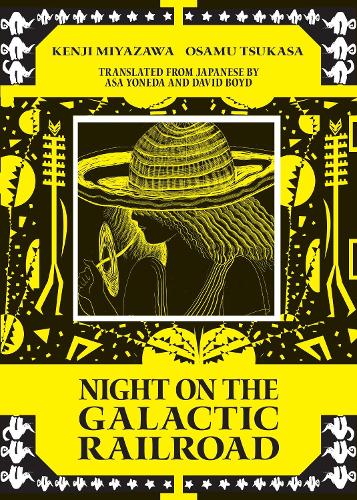
Night on the Galactic Railroad
(Hardback)
Publishing Details
Night on the Galactic Railroad
By (Author) Kenji Miyazawa
By (author) Osama Tsukasa
Archipelago Books
Elsewhere Editions
18th November 2025
21st October 2025
United States
Classifications
Children
Fiction
Physical Properties
Hardback
186
Width 152mm, Height 222mm
Description
The most renowned work by the legendary Japanese writer who inspired Studio Ghibli, Night on the Galactic Railroad is a classic for readers of My Father's Dragon and A Wrinkle in Time. An adventure story steeped in profound themes. The most renowned work by the legendary Japanese writer who inspired Studio Ghibli, Night on the Galactic Railroad is a classic for readers of My Father's Dragon and A Wrinkle in Time. An adventure story steeped in profound themes. On the eve of the Milky Way festival, Giovanni rushes past his classmates who are busy preparing for the celebration. He must get to his job at the printing office where he plucks tiny pieces of type with tweezers from a box, in exchange for a single silver coin. Later, he waits in a dusky kitchen that smells of cows for a bottle of milk to bring to his mother. Night has fallen when his classmates begin sailing gourds lit with candles down the black, glistening river. Giovanni wanders along a hillside. The dark blue sky begins to twinkle and shine. And suddenly, Giovanni finds himself transported to a compartment of the Galactic train. Across from him is his fellow classmate, the tender-hearted, enigmatic Campanella. So begins an expedition traversing the galaxy. Campanella and Giovanni, etched in a black-and-white gothic style, travel through fields of purple flowers, into constellations. They meet the strangest people. There's the lighthouse man, the bird catcher, and the shipwrecked children. Kenji Miyazawa's story unravels its mysterious thread, in an exquisite translation by Asa Yoneda and David Boyd. Osamu Tsukasa's illustrations combine the enigmatic beauty of Edvard Munch and Aubrey Beardsley's art nouveau ink drawings--both of whom were inspired by Japanese woodblock prints. Miyazawa's classic story will stay with readers long after childhood.
Author Bio
Kenji Miyazawa was a poet and farmer born in Iwate Prefecture. He studied geology at Morioka Imperial College of Agriculture and Forestry, moved to Tokyo, and began writing poetry, short stories, and children's books. He self-published his first book, a work for children, in 1924. Three of his books from the 1930s-Night on the Galactic Railroad, Matasaburo of the Wind, and Be not Defeated by the Rain-were published posthumously. Miyazawa's fiction, poetry, and children's stories sketch an ecological vision well ahead of its time. Drawing on his training as a scientist and a practitioner of Buddhism, Miyazawa developed a vision of interdependence among all forms of life at all times. His poetry and fiction for children and teens are popular in Japan today. Osamu Tsukasa was born in Maebashi, Japan in 1936. In 1964, he was a founding member of the Society for Independent Artists. His picture books include The Goose Child, Amenimomakezu, Machinto, The Old Woman's Tale, and A Million Doves. Tsukasa has written several books of fiction, including On Shadows and The Bronze Mediterranean, as well as books on art and literature, such as The Magic of Books, The Magic of Picture Books, and War and Art. Tsukasa's work has been shown in exhibitions including "The World of Osamu Tsukasa" at the Ikeda Museum of 20th Century Art and "Inside the Art of Osamu Tsukasa" at the Museum of Modern Art in Gunma. He has been awarded the Shogakukan Prize for Visual Arts, the Yasunari Kawabata Literary Prize, the Mainichi Prize for the Arts, and the Jiro Osaragi Prize. David Boyd is an Associate Professor of Japanese. He has translated fiction by Izumi Suzuki, Tatsuhiko Shibusawa, and Kanoko Okamoto, among others. His translations of novellas by Hideo Furukawa (Slow Boat; Pushkin Press, 2017) and Hiroko Oyamada (The Hole; New Directions, 2020) have won the Japan-U.S. Friendship Commission Prize for the Translation of Japanese Literature. Asa Yoneda was born in Osaka and studied language, literature, and translation at Oxford University and SOAS University of London. She now lives in Bristol, U.K. In addition to Yukiko Motoya, she has translated works by Banana Yoshimoto, Aoko Matsuda, and Natsuko Kuroda.
